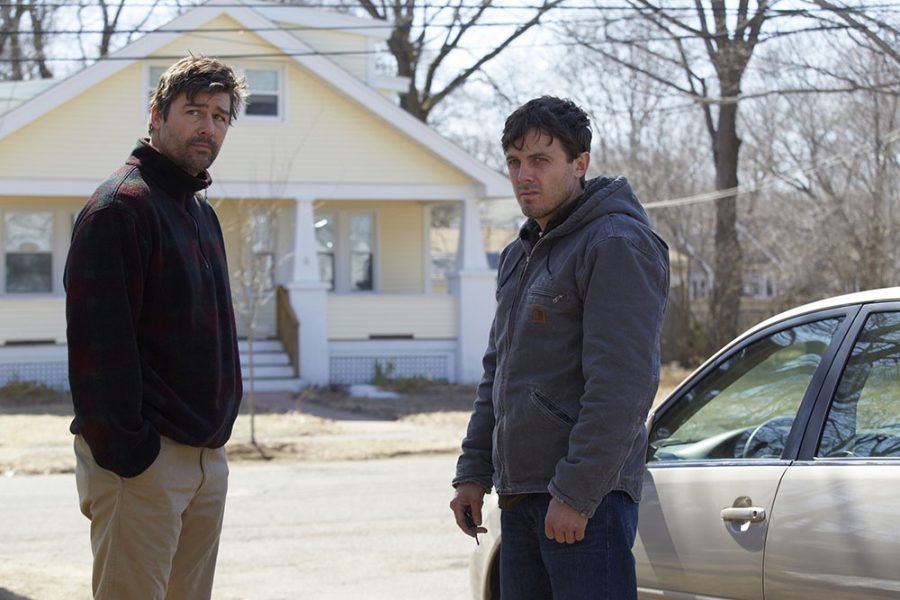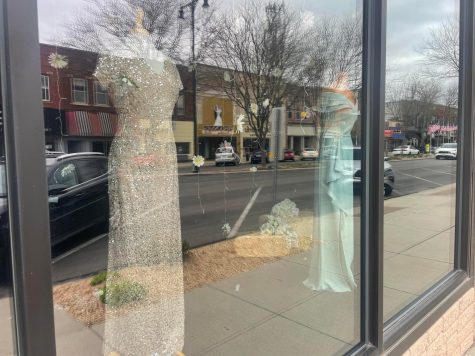Plumbing depths of sorrow in ‘Manchester by the Sea’
Kyle Chandler and Casey Affleck in "Manchester by the Sea." (Claire Folger/Sundance Institute)
December 6, 2016
By Mark Olsen
Casey Affleck has questions. Kenneth Lonergan also has questions. Together, they found more questions that, in the asking, came to feel something like answers.
Affleck is the lead actor and Lonergan the writer and director of “Manchester by the Sea,” a deeply felt examination of grief and guilt. The film has been receiving powerful reactions since its premiere this year at the Sundance Film Festival and recently opened in limited release to strong per-screen averages on its way to expanding across the country. The film also just received five Spirit Award nominations — including Affleck for male lead and Lonergan for screenplay — following its earlier four nominations from the Gotham Awards. (Affleck would win the Gotham for lead actor.)
In “Manchester,” Affleck plays Lee Chandler, a handyman and emotional hermit who returns to his seaside Massachusetts hometown after his older brother suddenly dies. There he discovers that his brother’s will specifies for him to adopt his teenage nephew, Patrick (Lucas Hedges).
While attempting to work out the logistics of the situation, Lee must confront long-pushed-down feelings for his ex-wife, Randi (Michelle Williams), and the tragic event that drove them apart.
“What I loved about the script was that the script did many things at once,” Affleck said recently. “It was deep and complicated, it was funny and sad, it was intricately crafted with a story in two different time periods, and it was also very naturalistic sounding. More than anything, I believed, understood and cared about the characters.”
Considering the awful tragedy that informs the film’s center, many reviews have made special notice that “Manchester by the Sea” is somehow both deeply serious and unexpectedly funny, lightened in part by the initially antagonistic dynamic between Lee and his young charge.
“I haven’t had many people talk about the film as if it’s a heavy oppressive experience,” Lonergan said. “I like people to know the film has humor.”
“When I read it I laughed out loud, but I was also very moved,” added Affleck. “And they happen sometimes right next to each other, which is a neat trick.”
Affleck and Lonergan were recently sitting together on a patio near the pool of a hotel in Beverly Hills. Affleck, a longtime vegan, was asking a waitress about dishes heading to other tables and inquiring about the coconut milk in a virgin pina colada. Lonergan teasingly asked if there was “vegan water” available. When the chips and guacamole Affleck ordered arrived, Lonergan dug in.
“You can make fun of him,” Lonergan said, “but you can’t argue with the results.”
The same might be said of their working dynamic as well, as a playful sense of camaraderie belies a deeper artistic simpatico.
Affleck recalled that the two first met when he was turned down for a number of roles in Lonergan’s plays — “not so much turned down as passed over,” corrected Lonergan — before finally being cast in a 2002 London production of “This Is Our Youth.” And they have been friends ever since.
The success of “Manchester by the Sea” has revived the profiles of the both of them.
Affleck, 41, was nominated for an Oscar for 2007’s “The Assassination of Jesse James by the Coward Robert Ford” but has always seemed to keep mainstream success at arm’s length. Just this year, he also appeared in the commercial historical drama “The Finest Hours” as well as the purposefully pulpy cop thriller “Triple 9.”
The infamous 2010 faux documentary “I’m Still Here” that Affleck made with his then-brother-in-law Joaquin Phoenix resulted in settlements for sexual harassment lawsuits from two women who worked on the film.
The lawsuits have become a source of renewed media interest in the wake of the acclaim for “Manchester” as well as the fate that befell another Sundance 2016 alum, “The Birth of a Nation’s” Nate Parker. (Affleck later could not be reached for comment on the matter.)
Lonergan, 54, is a celebrated playwright who was nominated for an Oscar for his 2000 debut film, the family drama “You Can Count On Me.” He then saw his second feature “Margaret,” a portrait of teenage angst and traumatic anguish, mired in editing-room controversies and a protracted lawsuit that overshadowed its eventual release in 2011.
As much as the role of Lee Chandler in “Manchester by the Sea” now seems tailor-made for Affleck, highlighting his quixotic mixture of the physical and the emotional and an uncanny ability to convey a wary, weary interiority, the part was not originally intended for him.
Lonergan first wrote the screenplay based on an idea brought to him by Matt Damon and John Krasinski. After a few other permutations — Damon to direct Krasinski, Lonergan to direct Damon — were thwarted by scheduling conflicts, the role landed with Affleck. (Damon is credited on the film as producer, Krasinski as executive producer.)
Lonergan was well prepared for Affleck’s habit of constant questioning, both before shooting and during. Rather than seeing his own inquisitiveness as somehow getting in the way of making the movie, Affleck sees it as a vital part of the process, “never getting to one hard and fast answer but just better and better questions bouncing back and forth.”
“It’s part of the actor’s job to show up with a head full of steam, to have their own take on this,” Affleck said. “So that way you’re not relying on, ‘OK, tell me how to do it.’ If you’re a director and someone shows up and asks how I do it, I’d imagine as a director you’re like, ‘Man, I’ve got a million decisions to make, can you show up with an idea for the scene?’”
This brings an appreciative, positive affirmation from Lonergan. Affleck attempted to further explain their onset dynamic by comparing the screenplay to a mountain planted with nuggets of gold for the actors to find and mine further, with Lonergan occasionally pointing the way.
“That’s a really generous metaphor, but I do like it, I have to say,” Lonergan said. “And without extending that metaphor that it’s a mountain of gold, you are occasionally saying, ‘If you look over here you might find something.’”
Affleck sees his methods as creative, not confrontational, underscored by a relentless drive to simply find the best version of a given moment.
“It’s really fun when a scene doesn’t work,” said Affleck. “There were a couple very long nights where people had been working for like 15 hours and the scene’s not working, and it must be something wrong with me, but that is really when I start to have a blast. It’s a collision of all these people eager to make something and all bringing their best work.”
Even as they continue promoting the movie together, Affleck and Lonergan seem to simply be continuing the conversations that led to the creation of Affleck’s performance in the movie, poking and prodding at their respective ideas, turning them over looking for something more.
“Sometimes we’d have two totally different takes on it because we’d been in separate houses that night thinking about it separately,” said Affleck. “Sometimes, on the best days, you do it both ways or you find some weird blend, you inspire one another to a new idea, but other days, one guy is just right. And usually it’s the person that wrote it and is directing it.”
Added Lonergan, “I agree with all of that except the last sentence.”
———
©2016 Los Angeles Times
Visit the Los Angeles Times at www.latimes.com
Distributed by Tribune Content Agency, LLC.
















